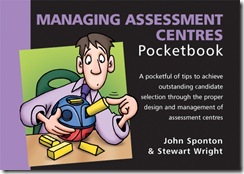This is part of an extended management course. You can dip into it, or follow the course from the start. If you do that, you may want a course notebook, for the exercises and any notes you want to make.
Interviews are an essential part of management: conducting them and also being interviewed from time-to-time, for promotions or a new job.
Interviewing others
Finding people’s faults is an easy task, and one most interviewers take to with relish. It serves little purpose, however, since we all have plenty of them. The primary purpose of a job interview is to find their talents, skills, expertise, motivation, enthusiasm…
These are what makes it worth considering someone for employment. Only then should you be evaluating whether any shortcomings raise the risk of employing that person too high.
Pocketblog covered the topic of interviewing in some depth in our three-part series: ‘The New Manager’s Guide to Interviewing’. It covered:
- Preparing the Ground
Increase your chances of success well before the interview.
It covers how to:- Think about the job requirements
- Handle the advertising and admin
- Review applications
- Prepare for the interview
- Getting it Right
Hints and advice for conducting and effective interviews.
It looks at:- Questioning
- Social skills
- Responding to candidates’ answers
- Inviting questions
- Polishing your Process
Tips and tricks of the trade, such as:- Fact checking
- The ‘horns and halo effect’
- Psychology
- Data protection
Being Interviewed
If there were only one tip that I could give to any interview candidate it would be this one:
Fundamentally, when you go for a job or promotion interview, your interviewer only wants to know one thing. All of their questions are just variants on one question – different ways to get at one answer.
And if you know what that question is and make sure that you answer it every time, by giving a different part of your answer to that one question with every answer you give, then you will have taken every opportunity the interviewer has given you.
The Question
So, what is that one question your interviewer wants answered?
‘Why should I recommend you for hiring or promotion?’
And how do you answer that? Simple. You have to tell them the benefit they, or their team or department, or their organisation will get from making that choice. And that boils down to the most fundamental question that humans ask: ‘what’s in it for me?’

That then begs the question: what do they want? To optimise your answers you have not only to show that you can deliver what they want, but you must also do your preparation and find out what they want. Six things are particularly common:
- Safety and Security
Employers – and interviewers – often want to avoid mistakes. Can you show that you are a safe choice; that you meet all of their fundamental requirements and have a track record to back that up? - Performance
What evidence can you give to show that your performance will be exceptional? Some employers want stars. - Quality
If the organisation puts a strong focus on quality in its materials, then so should you in your answers. Demonstrate your attention to detail and drive for perfection. Your written materials and personal appearance must reinforce this message. - Ease of Transition
In some circumstances, an employer is looking for an easy life. They are under pressure and don’t want to work hard to get a new staff member trained and ready. Like a good convenience meal, you need to show how you can deliver to the standard required with the minimum of preparation. - Cost
Beware of employers looking to minimise cost. If you do find one offering an attractive role, prepare your negotiating options in advance. Trial periods can make sense. But emphasise the difference between remuneration and employment costs and identify how employing you can be cheaper than a less experienced and less ‘expensive’ candidate. - Staying Power
One of the biggest costs of employment is the recruitment process. If your prospective employer is looking for someone who will commit to their organisation for a long time and you have changed jobs every 18 months, you will need to prepare a very fine answer to that challenge.
More on being Interviewed
Our earlier blog, ‘Seven ways to Interview well’ has… seven more great tips.





